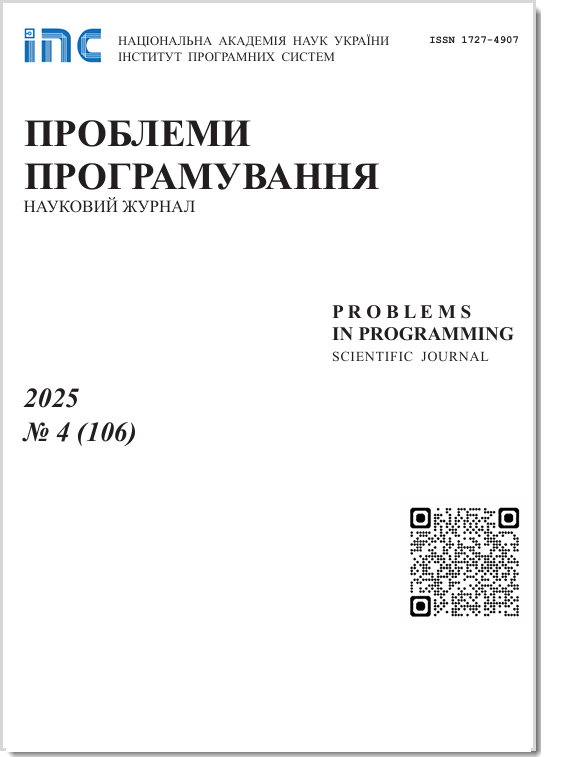Development of the intelligent control system of an unmanned car
Abstract
This study delves into creating an intelligent control system for self-driving vehicles, utilizing cutting-edge machine learning methods. Central to our approach is the NeuroEvolution of Augmenting Topologies (NEAT) algorithm, implemented in the Python programming language. NEAT plays a pivotal role in refining artificial neural networks, enabling autonomous cars to navigate diverse road conditions independently. Through rigorous experimentation, we demonstrate NEAT's capability to automate self-driving operations, ensuring adaptability to various driving scenarios. The result of the research is the development of a complex system proficient in autonomously navigating a variety of race tracks. NEAT's dynamic neural network structures help the vehicle learn quickly.The Python language is quite convenient for implementing such tasks thanks to a large number of libraries. Integration with Pygame equips the system with essential tools for graphics rendering and interaction. Iterative cycles of training and refinement significantly enhance the system's performance and adaptability. Neural networks adeptly learn to navigate tracks, maintain optimal speeds, avoid collisions, and tackle diverse racing challenges. This project demonstrates NEAT's capability, alongside Python and Pygame integration, in crafting intelligent control systems for self-driving cars. This holds promise for further development in autonomous driving technology, aiming to handle more intricate scenarios and seamlessly integrate with real-world hardware. In essence, the successful deployment of an intelligent control system for unmanned vehicles based on NEAT demonstrates the efficacy of evolutionary algorithms in tackling complex control problems. This sets the stage for further research and refinement in unmanned driving, fostering the development of safer and more efficient transportation systems.
Prombles in programming 2024; 2-3: 375-383
Keywords
Full Text:
PDFReferences
O. V. Barabash, N. B. Dakhno, H. V. Shevchenko and T. V. Majsak, "Dynamic models of decision support systems for controlling UAV by two-step variational-gradient method," 2017 IEEE 4th International Conference Actual Problems of Unmanned Aerial VehiclesDevelopments (APUAVD), Kiev, Ukraine, 2017, pp. 108-111. CrossRef
A. Dudnik, Y. Kravchenko, O. Trush, O. Leshchenko, N. Dakhno and V. Rakytskyi, "Study of the Features of Ensuring Quality Indicators in Multiservice Networks of the Wi-Fi Standard," 2021 IEEE 3rd International Conference on Advanced Trends in Information Theory (ATIT), Kyiv, Ukraine, 2021, pp. 93-98. CrossRef
A. Dudnik, Y. Kravchenko, O. Trush, O. Leshchenko, N. Dahno and Y.
Ryabokin, "Routing Method in Wireless IoT Sensor Networks," 2022 IEEE 3rd International Conference on System Analysis & Intelligent Computing (SAIC), Kyiv, Ukraine, 2022, pp. 1-6. CrossRef
N. Dakhno, O. Barabash, H. Shevchenko, O. Leshchenko and A.
Dudnik, "Integro-differential Models with a K-symmetric Operator for Controlling Unmanned Aerial Vehicles Using a Improved Gradient Method," 2021 IEEE 6th International Conference on Actual Problems of Unmanned Aerial Vehicles Development (APUAVD), Kyiv, Ukraine, 2021, pp. 61-65. CrossRef
S. Bhaggiaraj, M. Priyadharsini, K. Karuppasamy and R. Snegha, "Deep Learning Based Self Driving Cars Using Computer Vision," 2023 International Conference on Networking and Communications (ICNWC), Chennai, India, 2023, pp. 1-9. CrossRef
S. Bhaggiaraj, M. Priyadharsini, K. Karuppasamy and R. Snegha, "Deep Learning Based Self Driving Cars Using Computer Vision," 2023 International Conference on Networking and Communications (ICNWC), Chennai, India, 2023, pp. 1-9. CrossRef
K.O. Stanley, Efficient Evolution of Neural Networks through Complexification, 2004, 3406c.
K.O. Stanley, R. Miikkulainen, Evolving Neural Networks through Augmenting Topologies, 2002. CrossRef
K.O. Stanley, B.D. Bryant, and R. Miikkulainen. "Evolving Neural Network Agents in the NERO Video Game". In Proceedings of the IEEE
Symposium on Computational Intelligence and Games (CIG'05). Piscataway, NJ: IEEE.
K.O. Stanley, R. Miikkulainen. "Efficient reinforcement learning through evolving neural network topologies". In Proceedings of the Genetic and Evolutionary Computation Conference (GECCO2002). San Francisco: Kaufmann.
S. Whiteson, K.O. Stanley, and R. Miikkulainen. "Automatic feature selection in neuroevolution". In GECCO 2004: Proceedings of the Genetic and Evolutionary Computation Conference Workshop on Self-Organization, July 2004. CrossRef
S. Whiteson, P. Stone, K.O. Stanley, R. Miikkulainen, and N. Kohl. "Automatic Feature Selection in Neuroevolution". In Proceedings of the Genetic and Evolutionary Computation Conference (GECCO 05). pp. 1225-1232, Washington, D.C., June 2005. CrossRef
X. Yao. Evolving artificial neural networks. Proceedings of the IEEE, 87(9):1423-1447, 1999. CrossRef
K. O. Stanley, B. D. Bryant, and R. Miikkulainen. "Evolving adaptive neural networks with and without adaptive synapses". In Proceedings of the 2003 IEEE Congress on Evolutionary Computation (CEC-2003). Canberra, Australia: IEEE Press, 2003.
K. O. Stanley, and R. Miikkulainen. "Competitive coevolution through evolutionary complexification". Journal of Artificial Intelligence Research 21: 63-100, 2004. CrossRef
K. O. Stanley, and R. Miikkulainen. "Continual coevolution through complexification". In Proceedings of theGenetic and Evolutionary Computation Conference (GECCO-2002). San Francisco, CA: Morgan Kaufmann, 2002.
NEAT-Python 0.92 documentation. Welcome to NEAT-Python documentation! - NEAT-Python 0.92 documentation, 2022.
M. E. Timin. The robot auto racing simulator, 1995.
DOI: https://doi.org/10.15407/pp2024.02-03.375
Refbacks
- There are currently no refbacks.









